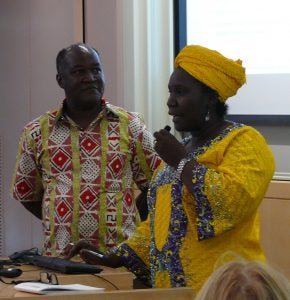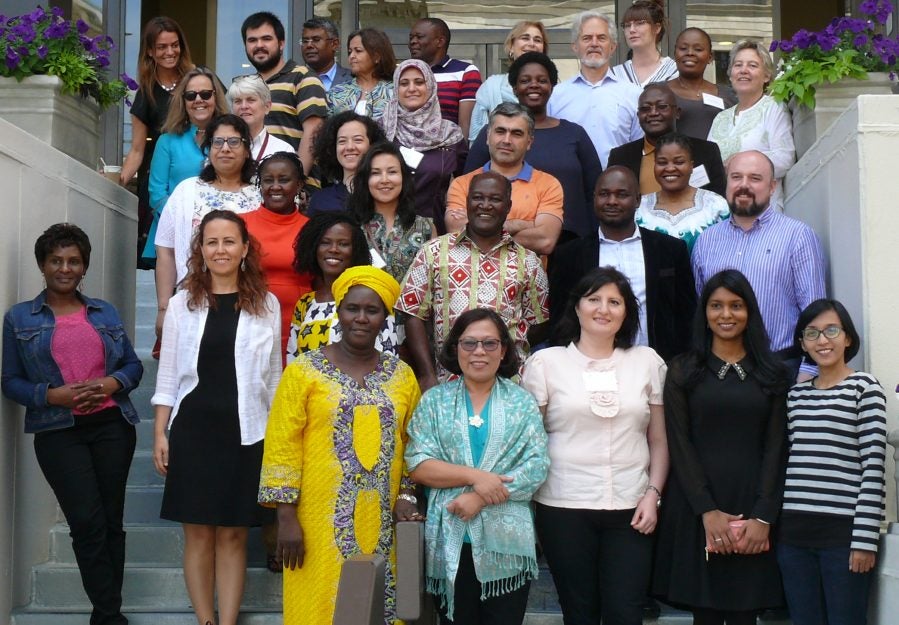By Rebecca Shin
This past year the François-Xavier Bagnoud Center for Health and Human Rights at Harvard University (Harvard FXB) has broadened its child protection pedagogy through three focused initiatives. At the end of June, we completed our first week-long Child Protection Executive Education Course, with leaders from UNICEF and their national partners. Participants from 13 countries across Africa, South America, South and East Asia, Central Europe and the Middle East made the long journey to the Harvard T.H. Chan School of Public Health campus in Boston for this intense program designed to advance the knowledge and capacity across all dimensions of the child protection profession.Topics included focused sessions on the impact of violence and abuse on the developing brain, use of data and evidence for stronger child protection advocacy, leadership in a multipolar system and the mapping and strengthening networks of capacity. All teams brought a real-world challenge they were faced with in their country which they presented to the group on the first day. Throughout the week the country teams refined their approach to this challenge, ultimately sharing their evolution in thinking with a panel of Harvard professors, child protection experts, and other participants on the last day. As one participant explained, “…from the first day of the course I have been discussing very difficult issues with my colleague that we have never discussed before.”
 In the fall we will launch the first HarvardX online course on child protection, offering students worldwide the opportunity to garner some of the insights that the certificate program provides. And notably, this May, for the fourth year running, Harvard FXB awarded an interdisciplinary qualification in child protection to Harvard graduate students who mastered the curriculum. Representing ten nationalities, six continents, and a range of Harvard graduate schools and disciplines, this year’s recipients of the Child Protection Certificate have diverse backgrounds and differing plans for career paths. However, all share the common goal of making the world a better place for children.
In the fall we will launch the first HarvardX online course on child protection, offering students worldwide the opportunity to garner some of the insights that the certificate program provides. And notably, this May, for the fourth year running, Harvard FXB awarded an interdisciplinary qualification in child protection to Harvard graduate students who mastered the curriculum. Representing ten nationalities, six continents, and a range of Harvard graduate schools and disciplines, this year’s recipients of the Child Protection Certificate have diverse backgrounds and differing plans for career paths. However, all share the common goal of making the world a better place for children.
The certificate, offered by Harvard FXB in partnership with UNICEF, is open to Harvard graduate students interested in exploring a career in child protection. Applications to the program grew by over 60 percent this year, with students across five Harvard graduate schools seeking to complete this multidisciplinary, specialized credential.
As we leave the 2017-2018 academic year and look towards 2018-2019, we reflect upon the changes to the program and the continuing need for well-rounded leaders within the child protection field. Protecting the safety and well-being of children is a major and ongoing global challenge. Irrespective of wealth or culture, children worldwide suffer from abuse, neglect, exploitation, and violence. The global population of over 2 billion children depends upon strong leaders and advocates to stand up for their rights and represent their voice in a world where they are at the mercy of the institutions and actions of adults. This pressing need led to the creation of the Child Protection Certificate program in 2014, founded with the generous support of Barrie Landry, a member of the US Fund for UNICEF’s National Board of Directors.
Successful completion of the certificate program requires a minimum of 12 graduate level credits selected from over 50 qualifying courses spanning the Harvard T.H. Chan School of Public Health, Harvard Law School, Harvard Kennedy School of Government, and the Harvard Graduate School of Education. Courses are grouped into thematic domains: Child Protection Systems, Violence Against Children, Justice for Children, Social Change and Family Strengthening, and Child Protection Leadership Tools. Candidates for the Child Protection Certificate must complete courses from at least three of the five domains, to ensure an understanding of the multidisciplinary nature of the field and the interactions between law, policy, socio-economic environment, public services, and the systems necessary to protect children.
This past year, the program included a new required bi-weekly seminar as well as a more informal student-led dinner networking opportunity called the “Child Protection Connection.” Students grew their networks, made new friends, and shared experiences and ideas. As one candidate told us, the Child Protection Certificate program was “one of the few spaces I have found at Harvard that combines students from several schools across the university.”
Every two weeks, as part of the required seminar, students were provided an opportunity to hear from and interact with child protection professionals with a wide range of expertise in both the domestic and international arenas. Seminar speakers included United Nations professionals, legal experts, child migration specialists, anti-trafficking professionals, scholar-activists, leaders within government, and those with senior backgrounds in child-specific nonprofits such as Foster America and Save The Children. As one certificate recipient said, the seminars were a “valuable space to learn about child protection from a variety of different perspectives and disciplinary lenses” and provided “a clearer sense of the wide-ranging challenges and considerations for effective child protection policy and implementation.” Additionally, the speakers helped prepare Child Protection Certificate candidates for the realities of the hard work that lies ahead, along with suggestions as how to stay both motivated and hopeful as they advance in their careers.
“…I appreciated the opportunity to hear the speakers’ honest assessment of the value and the challenges of their work and the organizations they worked with.”
—Harvard Graduate Student and Child Protection Certificate recipient
Overall, graduates of the Child Protection Certificate program say it has been especially helpful in expanding their view of the types of career options available, in making connections, and in being better able to tie together the multitude of agencies, issues and challenges that are needed to successfully protect and advocate for child rights. One Harvard graduate student in the program explained, “it definitely opened some doors and helped me better articulate my competencies and interests within this field.”
Applications to the Harvard FXB Child Protection Certificate program for the 2018-2019 academic year are available now. Students from any Harvard graduate school with an interest in child protection are invited to apply. Please keep an eye on our website for updated course information.
Meanwhile, it is with the utmost pride and respect that we extend warm congratulations to the Harvard FXB Class of 2018 Child Protection Certificate recipients!
Rebecca Shin is an FXB program coordinator, with responsibility for the child protection curriculum and other strategic initiatives.
Both photographs are of Executive Education participants.
Take a look at the 2018-2019 brochure for the Child Protection Certificate Program for Harvard graduate students and 2019 Child Protection Executive Education Course brochure for mid-career professionals.

